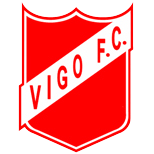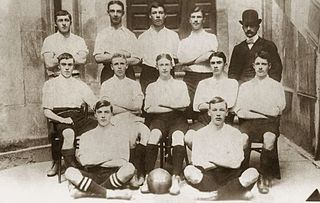 Team Logo | ||
| Full name | Real Fortuna Football Club | |
|---|---|---|
| Nickname(s) | Los Fortunistas | |
| Founded | 1908 (1905 - as Fortuna FC) | |
| Dissolved | 1923 | |
| Ground | Campo de Bouzas | |
Real Fortuna Football Club, was a Spanish football club based in Vigo, Galicia, founded in 1905.
 Team Logo | ||
| Full name | Real Fortuna Football Club | |
|---|---|---|
| Nickname(s) | Los Fortunistas | |
| Founded | 1908 (1905 - as Fortuna FC) | |
| Dissolved | 1923 | |
| Ground | Campo de Bouzas | |
Real Fortuna Football Club, was a Spanish football club based in Vigo, Galicia, founded in 1905.
Vigo was one of the cities through which football entered the Iberian Peninsula, thanks to British sailors and workers. The first demonstrations of the sport were made by the team of the British company Electric Telegraph Company, which was installing the telegraph cable between the islands and Vigo, to connect with Lisbon from there. This team was called the Exiles Football Club and played several matches against British merchant and military crews passing through the Port of Vigo. The first mixed teams between Galicians and the British were soon created, such as Petit FC, who in 1905 beat the Exiles for the first time. [1]
Following the example of Barcelona, where FC Barcelona and Català FC had been founded in 1899, Vigo came up with their own clubs in 1905, the Vigo Football Club and the Fortuna Football Club, and from the cradle, there has been a great rivalry between the two. Fortuna would receive the title of "Real" in 1908, thus finally adopting the name of Real Fortuna Football Club de Vigo. [2] Fortuna won the Galician Championship nine times in 1906, 1907, 1910, 1911, 1912, 1915, 1918, 1921 and 1922.
In order to create a powerful team that could successfully compete against the likes of Barcelona and Madrid, Fortuna merged with their great rivals, now called Real Vigo Sporting Football Club, to give birth to Real Club Celta de Vigo in 1923. The last match between these two rivals was held on 11 March 1923, which the fortunistas lost. Ramón González scored the only goal of the game in a 1–0 loss. [2]
Real Vigo Sporting: Isidro; Otero, Pérez; Queralt, Hermida, Vázquez; Gerardo, R. González, Chiarroni, Tito and Pinilla
Real Fortuna: Lilo; Juanito, Pasarín; Balbino, Torres, Córdoba; Reigosa, Rodríguez, Chicha, Correa and Salvador.

Real Vigo Sporting Club, was a Spanish football club based in Vigo, Galicia, founded in 1905.
Ramón "Moncho" Gil Sequeiros was a Spanish football player who played as a forward. He was a member of the Spain national team that won the silver medal at the 1920 Summer Olympics.

Luis Otero Sánchez-Encinas was a Spanish footballer who played as a defender and who competed in the 1920 Summer Olympics, being a member of the Spanish team that won the silver medal at the tournament.
The King Alfonso XIII's Cup 1926 was the 26th staging of the Copa del Rey, the Spanish football cup competition.

Real Club Celta de Vigo, commonly known as Celta Vigo, is a Spanish professional football club based in Vigo, Galicia, that competes in La Liga, the top tier of Spanish football. Nicknamed Os Celestes, the club was founded in August 1923 as Club Celta, following the merger of Real Vigo Sporting and Real Fortuna. The club's home stadium is Balaídos, which seats 24,870 spectators.

Campo de Coia was a sporting venue in Coia, Vigo, Spain, which was the home ground of Celta Vigo, and its predecessor Vigo Sporting Club, between 9 February 1908 and December 1928.
José Chiarroni Pazos was a Spanish footballer of the 1920s who played as a center-forward.

Balbino Clemente Núñez, better known as Balbino, was a Spanish footballer who played as a midfielder. He was part of the first-ever team fielded by Celta de Vigo in 1923. His brother Juanito was also a footballer.
Pedro Martínez Pinilla was a Spanish footballer who played as a forward for Celta de Vigo. Pinilla had the honor of playing in the first official match in the history of Celta, scoring the opening goal in a 2–0 win over Unión Sporting Club on 7 October of 1923. He also played for the Galicia national team between 1922 and 1923.
Isidro Rodríguez Gómez, sometimes known as just Isidro, was a Spanish footballer who played as a goalkeeper.
Ramón González Figueroa was a Spanish footballer who played as a centre forward. He was a member of the Spanish squad that competed in the 1920 Summer Olympics, but did not make any appearances.
Luís Correa was a Spanish footballer who played as a forward. He was part of the first-ever team fielded by Celta de Vigo in 1923. The dates of his birth and death are unknown.
Jacobo Torres Martínez was a Spanish footballer who played as a midfielder for Celta de Vigo. He was part of the first-ever team fielded by Celta de Vigo in 1923.
Domingo Queralt was a Spanish footballer who played as a midfielder. He was part of the first-ever team fielded by Celta de Vigo in 1923.
Juan Clemente Núñez, better known as Juanito, was a Spanish footballer who played as a defender. His brother Balbino was also a defender. He was a member of the first-ever team fielded by Celta de Vigo in 1923.

The Exiles Cable Club was a multi-sports club based in Galicia, Vigo. It was founded in 1873 by English workers of the Eastern Telegraph Company. It was one of the first companies dedicated to sports in the country, most notably, football, having a section dedicated to the said sport due to its rapid growth in England, the homeland of the company's workers. Recent studies have shown that the Exiles football team, known as Exiles Foot-Ball Club or Exiles FC, was the first football club to have been recorded in the Iberian Peninsula, being one of the proto-clubs that pioneered and expanded football in Spain, together with the Rio Tinto English Club (1878) and the Cricket and Football Club of Madrid (1879).
Manuel Posada Tapias, better known as Manolo Posada, was a Spanish footballer who played as a forward for Real Madrid and Celta de Vigo. He is best known for being part of the first-ever team fielded by Celta de Vigo in 1923.
Luciano Reigosa Martín was a Spanish footballer who played as a midfielder for Celta de Vigo. The dates of his birth and death are unknown. He is best known for being part of the first-ever team fielded by Celta de Vigo in 1923, and remained loyal to the club in its first decade of existence, until 1933.

Manuel de Castro González, better known as Hándicap, was a Spanish sports journalist, football executive, manager, referee, and politician. He was one of the most important figures in the amateur beginnings of football in Vigo, being noted for his prominent role in promoting football in the city and as the fundamental head behind the foundation of Celta de Vigo in 1923.
José Hermida Losada, better known as Pepe Hermida, was a Spanish footballer who played as a midfielder for Celta de Vigo. He was part of the first-ever team fielded by Celta de Vigo in 1923. He also played for the Galicia national team between 1922 and 1923.